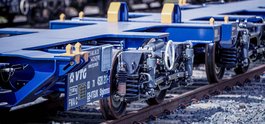In the future, freight wagons should travel the rails more quietly, energy-efficiently and cost-effectively. With this in mind, the DB Cargo/VTG consortium is developing and testing four new wagon types as part of the "Innovative freight wagons" project subsidized by Germany's Federal Ministry of Transport (BMVI). The wagons have been in service since March, and have already clocked up half of their scheduled quota of 150,000 test kilometers. Federal transport minister Andreas Scheuer today stopped by at the service point in Berlin to see the project for himself.
The innovations range from the use of lightweight components to energy savings and noise reduction, from customized wagon adjustments to accommodate freight to new digital modules that optimize freight wagon handling.
"Our research project is putting high-tech wagons on the rails," the transport minister noted. "We are trialing digital innovations and the latest noise reduction technologies in an endurance testing context. I am pleased at the findings of the initial measurements. They show that all the wagons are well within the permissible noise thresholds and are also saving energy. In the future, rail-borne freight traffic can be quieter, more energy-efficient and more cost-effective. And that marks an important step toward getting more goods on the rails, while raising overall acceptance of rail freight transportation in general."
"The project is already demonstrating the huge potential of rail freight transportation when all stakeholders pull together," says Dr. Heiko Fischer, Chief Executive Officer of VTG AG. Even just automating brake testing – one aspect of the project trials – makes it possible to save about 30 minutes per train on dispatch handling, he says. "That makes rail more attractive in competition with other modes of transport," Fischer adds, pointing out that the optimized design of the VTG wagons is playing a part too: "The lower weight lets you increase the payload, which in turn makes rail transportation more cost-effective."
"This partnership is driving innovations in the interests of our customers and creating competitive advantages for rail that are urgenatly needed," stresses Alexander Doll, member of the Management Board for Freight Transport and Logistics at DB. The multifunctional flat wagon was designed specially for customers of DB Cargo in the steel industry, he says. It carries steel plating to the rolling mills, and the same wagons can then take the finished coils from there to the next recipient. "Instead of needing two wagon types, as in the past, we can now make do with one – which is a huge benefit across the whole of the transportation chain," Doll continues. "And thanks to a lightweight design inspired by the aircraft construction industry, we are also saving energy."
The "Innovative freight wagons" project was launched in October 2016 and will run until the end of 2018. Test operations commenced in March 2018. The wagons still have around 75,000 kilometers to travel on Europe's rails. The Federal Ministry of Transport is contributing a total of 18 million euros to the project. DB Cargo and VTG are themselves shouldering all procurement costs for the innovative freight wagons and components – more than six million euros in all. The findings to date already look very promising and showcase the prospects opened up by technological innovations. Whether or not these developments stand up to practical testing from the perspective of cost-effectiveness will be shown by the remaining test cycles.
-
- Products and Services
- Fleet
- Current Wagon Availability
- Wagon Maintenance
- iWagon
- Company
- News
- Career
